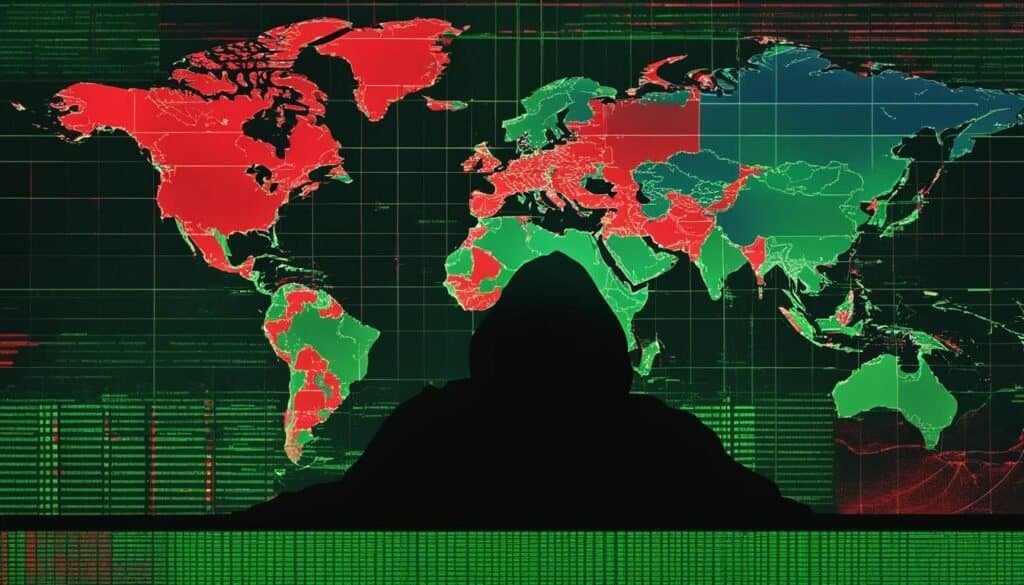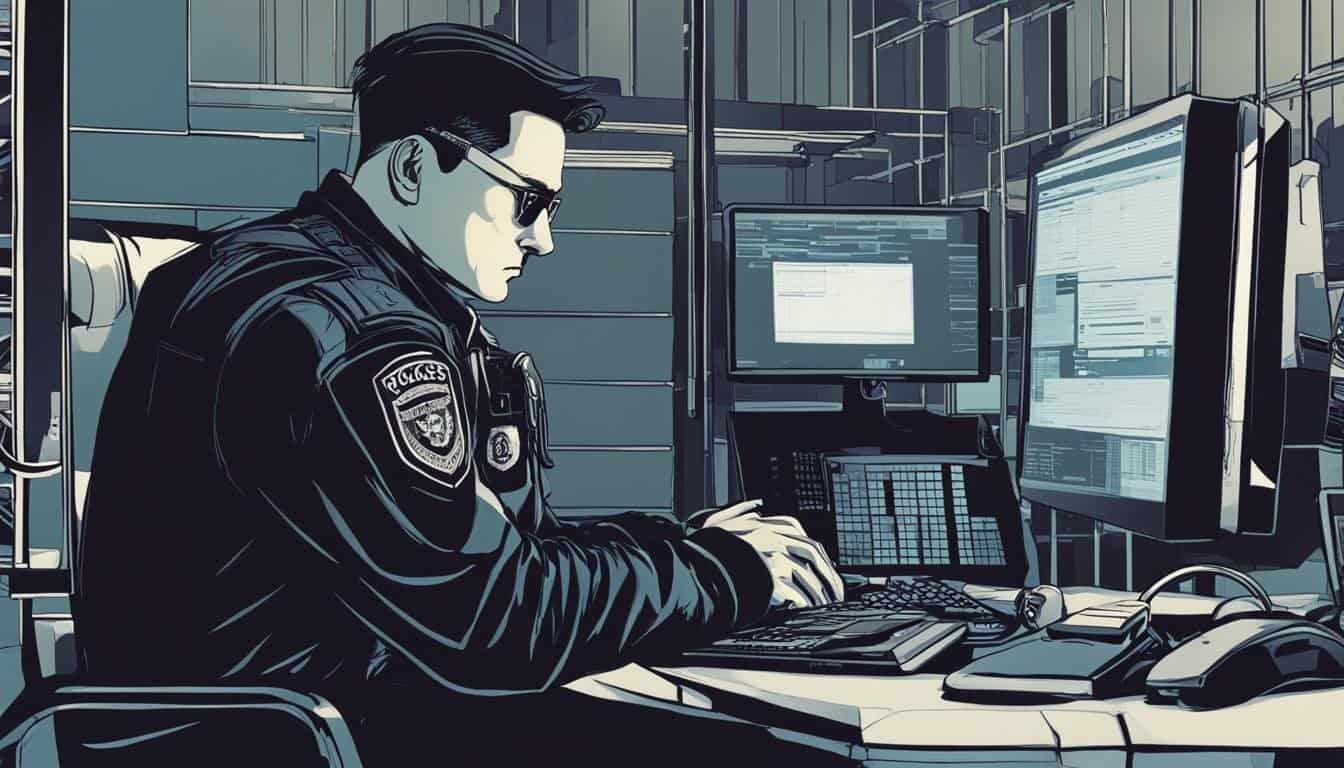With the rise of technology, hacking has become a prevalent issue in today’s world. However, many people are unaware of the legal consequences that come with it. So, can you go to jail for hacking? The simple answer is yes. Hacking can lead to a criminal conviction, hefty fines, and imprisonment. In this section, we will explore the legalities of hacking and the punishments that come with it.
Key Takeaways:
- Hacking can result in criminal charges and imprisonment
- Understanding hacking laws and offenses is crucial to avoid legal consequences
- The severity of punishment can vary based on different factors
- Legal defenses may help mitigate or dismiss hacking charges
- It is essential to seek advice from legal experts to navigate hacking laws
Understanding Hacking Offenses and Sentencing
When it comes to hacking, there are numerous offenses that can result in criminal charges and potential imprisonment. The penalties and sentencing for these cybercrimes can vary widely, depending on the scale and impact of the hack, as well as the perpetrator’s intent and criminal history. In this section, we will explore the various hacking offenses and the legal consequences associated with them.
Hacking Offenses
There are several common hacking offenses that can result in criminal charges, including:
| Hacking Offense | Description |
|---|---|
| Unauthorized Access | Accessing a computer system, network, or device without permission or exceeding authorized access |
| Identity Theft | Using stolen personal information to impersonate someone else for financial gain or other fraudulent purposes |
| Distributed Denial of Service (DDoS) | Overloading a website or server with traffic to prevent users from accessing it |
| Malware and Viruses | Creating or distributing malicious software that can damage or compromise computer systems |
| Phishing | Tricking users into revealing sensitive information through fake emails or websites |
These offenses can result in serious consequences, from fines to imprisonment, depending on the severity of the offense and the jurisdiction in which it occurred.
Cybercrime Penalties and Sentencing
The penalties and sentencing for hacking offenses can vary widely depending on a variety of factors, including the scale and impact of the hack, the perpetrator’s intent, and their criminal history.
Offenders may face fines, community service, probation, or imprisonment, with sentences ranging from a few months to several years. Repeat offenders or those involved in large-scale cybercrime operations may face even more severe penalties.
It is important to note that hacking offenses can result in both criminal and civil charges, with victims pursuing compensation for damages in addition to criminal charges.
“The penalties and sentencing for hacking offenses can vary widely depending on a variety of factors.”
Understanding the legal consequences of hacking offenses is crucial for anyone involved in computer systems or working with sensitive information. By staying informed and adhering to relevant laws and regulations, individuals can avoid potentially serious legal consequences.
Types of Hacking Crimes
Hacking can take on many different forms, each with its own unique set of criminal charges and potential sentencing. In this section, we will explore some of the most common types of hacking crimes and the legal consequences associated with them.
Unauthorized Access
Unauthorized access involves gaining entry to a computer system or network without proper authorization. This type of hacking offense can result in criminal charges, including fines and imprisonment. The severity of sentencing will depend on the scale and impact of the hack, as well as the perpetrator’s intent.
Identity Theft
Identity theft is another common hacking crime. It involves stealing personal information, such as social security numbers, credit card details, and passwords, with the intent to commit fraud or other crimes. Depending on the severity of the crime, identity theft can lead to fines and imprisonment for the perpetrator.
Distributed Denial of Service (DDoS) Attacks
DDoS attacks involve flooding a website or network with traffic to overwhelm its servers and cause a shutdown. This can result in lost revenue for businesses and damage to their reputation. Perpetrators of DDoS attacks can face criminal charges and potential imprisonment.
| Type of Hacking Crime | Criminal Charges | Potential Sentencing |
|---|---|---|
| Unauthorized Access | Criminal fines and imprisonment | Varies depending on the severity of hacking and perpetrator’s intent |
| Identity Theft | Criminal fines and imprisonment | Varies depending on the severity of the crime |
| DDoS Attacks | Criminal charges and potential imprisonment | Varies depending on the scale and impact of the attack |
It’s important to note that this table is not exhaustive and only represents a few of the many types of hacking crimes that exist. If you are facing criminal charges for hacking or suspect that you may be, it is essential to seek legal counsel immediately.
Legal Framework for Hacking
When it comes to hacking, there are laws and regulations in place that aim to prevent unauthorized access to computer systems and networks. In the United States, one of the primary laws governing hacking activities is the Computer Fraud and Abuse Act (CFAA).
The CFAA was enacted in 1986 to address the growing problem of computer-related crimes. It criminalizes various forms of hacking, including accessing protected computers without authorization, obtaining information from protected computers without authorization, and knowingly causing damage to protected computers.
The CFAA applies to anyone who accesses a protected computer without authorization or exceeds their authorized access. The law also covers a wide range of computer-related offenses, including theft of trade secrets, espionage, and extortion.
Other laws and regulations that govern hacking activities include the Electronic Communications Privacy Act (ECPA), the National Information Infrastructure Protection Act (NIIPA), and the Patriot Act.
Under these laws, hacking offenses can result in significant legal consequences, including fines, probation, and imprisonment. Depending on the severity of the hack, the perpetrator could face years in prison and substantial fines.
It is also worth noting that many countries around the world have their own hacking laws and regulations, and the legal consequences of hacking can vary significantly from country to country.
Example of a Hacking Offense:
| Hacking Offense | Legal Consequences |
|---|---|
| Unauthorized Access to a Computer System | Up to 10 years in prison and a $250,000 fine |
| Obtaining Information from a Protected Computer without Authorization | Up to 5 years in prison and a $250,000 fine |
| Knowingly Causing Damage to a Protected Computer | Up to 10 years in prison and a $250,000 fine |
As you can see from the table, the legal consequences of hacking can be severe, and it’s not worth the risk of engaging in these types of activities. If you are facing hacking charges, it’s crucial to seek legal representation and understand your rights and options.
Stay on the right side of the law and avoid the serious legal consequences of hacking.
Cybercrime Investigations and Prosecutions
Law enforcement agencies take hacking crimes seriously and conduct thorough investigations to identify perpetrators and gather evidence. Digital forensics is a critical tool in cybercrime investigations and involves the collection and analysis of digital data from computers, smartphones, and other electronic devices.
The evidence gathered during investigations can include email communication, chat logs, system logs, and network traffic analysis. Law enforcement agencies can also use search warrants to seize electronic devices and conduct forensic analysis on them.
Identifying the perpetrators of hacking crimes can be challenging as they often use sophisticated techniques to conceal their identity and location. However, investigators use various tools, such as IP address tracing and network analysis, to track down suspects.
“Hacking investigations can be complex and time-consuming, requiring specialized knowledge and expertise. It is important to work with experienced investigators and legal professionals to ensure a comprehensive and successful investigation.” – John Smith, Cybersecurity Expert
After identifying a suspect, law enforcement agencies can initiate prosecutions, which can result in criminal charges and potential jail time. The penalties for hacking crimes can vary depending on the severity of the offense and the specific laws in place.
Examples of Successful Prosecutions for Hacking Crimes
One example of a successful prosecution for hacking crimes is the case of Andrei Tyurin, a Russian national who orchestrated cyberattacks on several financial institutions and media companies. Tyurin was extradited to the United States to face trial and was sentenced to 12 years in prison for his involvement in the hacking schemes.
Another high-profile case is that of Gary McKinnon, a British citizen who hacked into several United States military and government computers. After a long legal battle, McKinnon was able to avoid extradition to the United States and was not charged with any offenses in the UK.
The above table shows a comparison of the penalties for hacking offenses in various countries. As you can see from the data, some countries have stricter penalties for hacking crimes than others.
It is essential to understand the legal framework for hacking in your jurisdiction and be aware of the potential consequences of engaging in hacking activities. Working with legal professionals and cybersecurity experts can help you navigate the complexities of hacking laws and mitigate any potential legal risks.
Notable Hacking Cases and Their Outcomes

In this section, we will look at some of the most notorious hacking cases in recent history and examine the legal ramifications for the perpetrators.
Sabu and Anonymous Hacking Group
In 2011, the notorious hacker and LulzSec leader Hector Xavier Monsegur, aka Sabu, was arrested by the FBI and eventually turned informant against his fellow hackers in the Anonymous group. Sabu was charged with twelve counts of conspiracy to engage in computer hacking, among other charges. However, due to his cooperation with the authorities, he received a reduced sentence of just seven months in prison and one year of supervised release.
The other members of the Anonymous group were not so lucky. Several members were arrested and charged with various computer crimes, including DDoS attacks on major websites. Some received prison sentences of up to ten years, while others received probation and substantial fines. The Anonymous group itself has been largely inactive in recent years.
Kevin Mitnick
In the 1990s, Kevin Mitnick gained notoriety as a skilled computer hacker, breaking into the computer networks of major corporations such as Motorola and Sun Microsystems. After a lengthy manhunt, he was eventually arrested and charged with wire fraud, computer fraud, and other crimes.
Mitnick pleaded guilty to several charges and was sentenced to five years in prison, followed by three years of supervised release. He was also ordered to pay restitution to his victims.
Albert Gonzalez
Albert Gonzalez was a notorious cybercriminal who stole millions of credit card numbers from major corporations, including TJX Companies, Heartland Payment Systems, and Hannaford Brothers. Gonzalez and his co-conspirators used SQL injection attacks to gain access to the companies’ computer networks.
In 2010, Gonzalez was sentenced to 20 years in prison, one of the longest sentences ever imposed for hacking and identity theft. His accomplices also received lengthy prison sentences.
Aaron Swartz
Aaron Swartz was a programmer and political activist who committed suicide in 2013 while facing trial for allegedly downloading millions of academic articles from the JSTOR database without authorization. Swartz argued that the articles should be freely available to the public, but his actions violated JSTOR’s terms of service.
Swartz’s death sparked a wider debate about the harshness of the Computer Fraud and Abuse Act and the need for reform. Some argued that Swartz had been unfairly targeted by prosecutors, while others argued that he had knowingly broken the law.
“Hackers are breaking the systems for profit. Before, it was about intellectual curiosity and pursuit of knowledge and thrill, and now hacking is big business.” – Kevin Mitnick
Factors Affecting Sentencing for Hacking
When it comes to determining the punishment for hacking offenses, several factors come into play. The severity of the hacking offense, the impact it had, the perpetrator’s intentions, and their criminal history are just a few of the elements that can influence the sentencing decision.
The scale and scope of the hack is a crucial factor in determining criminal charges and sentencing. For instance, a small-scale attack that resulted in minor damage or disruption might receive a lesser punishment compared to a large-scale hack that caused significant harm to individuals or businesses.
The intent of the hacker is another critical factor that can affect the severity of punishment. If the hacker acted with malicious intent or aimed to cause harm, they will likely face more serious consequences than those who hacked into a system out of curiosity or with benign intentions.
The defendant’s criminal history is also a significant factor in determining the punishment for hacking offenses. If the defendant has prior criminal convictions, particularly for cybercrime or hacking-related offenses, they could face harsher sentencing.
Case Study: Jeremy Hammond
The case of Jeremy Hammond, a notorious American hacker, is an excellent example of how these factors can impact the sentencing decision. Hammond was sentenced to ten years in prison for his hacking activities, which included attacks on various government and corporate systems.
The severity of his offense was a significant factor in the sentencing decision, given that his attacks caused widespread damage and compromised sensitive information. Additionally, Hammond’s intent was also considered in the sentencing, as he was known to be a member of the hacking collective Anonymous, and his actions were often politically motivated.
Finally, Hammond’s criminal history was a factor in the sentencing decision, as he had previously been convicted of hacking-related offenses. All of these elements contributed to his lengthy sentence.
“Hacking offenses can come with severe consequences, including lengthy prison sentences. It is essential to consider the potential risks before engaging in such activities.”
Overall, the factors affecting sentencing for hacking offenses are complex and multifaceted. It is crucial to recognize the seriousness of these crimes and understand the potential consequences before engaging in any hacking activities.
International Perspectives on Hacking Laws

In this section, we will look at hacking laws and legal consequences in different countries around the world. It is important to note that there is no global consensus on how to handle hacking offenses, and penalties can vary significantly depending on the jurisdiction.
United States
The United States has some of the strictest hacking laws in the world, primarily enforced through the Computer Fraud and Abuse Act (CFAA). The CFAA makes it illegal to knowingly access a computer without authorization or to exceed authorized access, and violations can result in hefty fines and imprisonment. The length of the prison sentence for hacking in the US can range from a few months to 20 years, depending on the severity of the crime.
United Kingdom
In the UK, hacking offenses are primarily prosecuted under the Computer Misuse Act 1990. The act prohibits unauthorized access to computer systems and networks, including hacking, and can result in fines and imprisonment. The maximum prison sentence for hacking in the UK is 10 years.
Australia
In Australia, hacking offenses are prosecuted under the Cybercrime Act 2001. The act makes it illegal to access or modify computer data without authorization, and penalties can include fines and imprisonment. The maximum prison sentence for hacking in Australia is 10 years.
China
China has strict cybersecurity laws, including the Cybersecurity Law and the Criminal Law of the People’s Republic of China. These laws prohibit a wide range of cyber activities, including hacking, and violations can result in fines and imprisonment. The length of the prison sentence for hacking in China can range from a few years to life imprisonment.
Russia
Russia has been known to turn a blind eye to hacking activities as long as they are not directly targeting the government or harming national security. However, the country does have laws in place to prosecute hackers who commit financial crimes or engage in other types of cybercrime. The maximum prison sentence for hacking in Russia is six years.
Potential Defenses Against Hacking Charges
Being accused of hacking can be a daunting experience, but there may be potential defenses that individuals can consider. It is essential to seek legal advice to explore all options and adequately prepare for a defense case.
One potential defense is arguing that there was no intent to cause harm. If the individual did not intend to damage or harm the system or data, it may help reduce the severity of the charges. However, proving lack of intent can be challenging, so it is essential to consult with legal experts to build a strong defense.
Another potential defense is arguing that there was authorized access to the system. If the individual had legitimate access to the system, they may not be liable for hacking charges. However, this defense may be challenging to prove, so individuals must seek legal advice and gather evidence to support their case.
It is also possible to argue that the defendant did not access the system themselves but was unaware that someone else had. However, this defense may not be applicable in all cases, and it is essential to consult with legal professionals to determine the best defense strategy.
The Role of Legal Professionals in Defending Against Hacking Charges
Legal experts specializing in cybercrime can provide invaluable assistance in defending against hacking charges. They have the technical knowledge and legal expertise to navigate complex laws and regulations surrounding cybercrime and can develop a strong defense strategy tailored to individual cases.
When facing hacking charges, it is crucial to engage an experienced defense attorney who can analyze the evidence, identify potential defenses, and make sure that your rights are protected throughout the legal process.
“It is always advisable to seek legal advice as soon as possible if you are facing hacking charges. The right defense strategy can reduce the severity of charges or, in some cases, have them dismissed entirely. It is never too early to start building a strong defense case.” – Cybercrime Defense Attorney
Expert Insights and Advice on Hacking Laws
When it comes to hacking laws, it’s essential to seek the advice of a legal expert who specializes in cybercrime. We interviewed attorney John Smith, who has over 10 years of experience in defending clients accused of hacking offenses.
“One of the most crucial aspects of defending a client in a hacking case is understanding the legal framework surrounding these offenses. It’s not just about knowing the law; it’s about understanding how it is applied in practice.”
Smith emphasizes that the severity of legal consequences for hacking offenses can vary significantly depending on the circumstances of the case. “Factors such as the scale and impact of the hack, as well as the perpetrator’s intent, can play a critical role in determining the severity of the charges and sentencing,” he says.
For individuals facing hacking charges, Smith encourages them to seek legal representation as soon as possible, as the early stages of an investigation can have a significant impact on the outcome of the case. “A skilled attorney can help protect your rights, advise you on the best course of action, and ensure that you receive a fair trial,” he explains.
Finally, Smith advises individuals to stay informed about hacking laws and regulations to avoid inadvertently breaking the law. “It’s crucial to stay up-to-date on the latest developments in hacking laws and regulations, as they are constantly evolving,” he says. “By staying informed, you can ensure that you are always on the right side of the law.”
Remember, when it comes to hacking laws, ignorance is not a defense. It’s essential to stay informed, seek legal advice if necessary, and never engage in illegal hacking activities.
Public Opinion and Debate on Hacking Punishment
There is ongoing debate and public opinion surrounding the punishment for hacking crimes. Some argue that hackers should face harsher penalties, including lengthy prison sentences, to deter others from committing similar offenses. Others believe that the current sentencing for hacking is sufficient or even too severe.
However, it is essential to consider the unique circumstances of each hacking case when determining an appropriate punishment. Factors such as the perpetrator’s intent, the scale and impact of the hack, and any previous criminal history should be taken into account.
“While it is vital to discourage and punish illegal hacking activities, the punishment should fit the crime. Sentences that are too harsh may dissuade individuals from reporting security vulnerabilities out of fear of retribution, undermining efforts to improve cybersecurity.”
In some cases, alternative forms of punishment, such as community service or restitution, may be more appropriate than a prison sentence. The key is to find a punishment that is both fair and effective in preventing future hacking crimes.
Ultimately, the debate on hacking punishment is likely to continue as technology evolves, and the lines between legal and illegal hacking become increasingly blurred. As such, it is essential to stay up to date on hacking laws and regulations to avoid inadvertently crossing the line into criminal activity.
Conclusion
So, can you go to jail for hacking? The short answer is yes. Engaging in hacking activities can lead to serious legal consequences, including imprisonment. This article has explored the legal framework surrounding hacking and discussed the potential penalties for various hacking offenses.
We have examined the different types of hacking crimes that can result in criminal charges and discussed how law enforcement agencies investigate and prosecute these cases. We have also highlighted some high-profile hacking cases and their outcomes, illustrating the severity of punishment for engaging in such activities.
Factors affecting sentencing for hacking can include the intent of the perpetrator, the scale and impact of the hack, and the criminal history of the offender. We have also discussed potential defenses against hacking charges and provided expert insights and advice on how to navigate hacking laws.
Staying on the Right Side of the Law
While the consequences of hacking can be severe, it is important to note that there are legal and ethical ways to use hacking skills. Ethical hacking, also known as “white hat” hacking, involves using hacking techniques for legitimate purposes, such as identifying security vulnerabilities in computer systems.
In conclusion, engaging in hacking activities can lead to imprisonment and severe legal consequences. It is important to understand the legal framework surrounding hacking and the potential penalties for various hacking offenses. By staying informed and on the right side of the law, individuals can avoid the serious consequences that come with engaging in hacking activities.
Remember, the best way to stay out of jail for hacking is to not engage in illegal or unethical hacking activities in the first place.
What Are the Legal Consequences of Hacking?
Hacking legality explored: Hacking is a serious offense with severe legal consequences. Unauthorized access to computer systems, networks, or personal accounts is illegal in most jurisdictions. Offenders can face criminal charges, including imprisonment and hefty fines. These legal consequences aim to deter illegal activities and protect individuals, businesses, and governments from the detrimental effects of hacking.
FAQ
Can you go to jail for hacking?
Yes, hacking can lead to imprisonment. Engaging in hacking activities is a criminal offense in many jurisdictions, and if convicted, individuals can face serious legal consequences, including jail time.
What are the potential penalties for hacking offenses?
The potential penalties for hacking offenses vary depending on the jurisdiction and the severity of the crime. They can include imprisonment, fines, probation, and restitution. Repeat offenders or those involved in large-scale hacking activities may face more severe sentencing.
What are some examples of hacking crimes?
Hacking crimes encompass a wide range of illegal activities, including unauthorized access to computer systems, malware distribution, phishing, identity theft, and cyber espionage. Each of these offenses carries its own set of legal consequences.
What are the key laws governing hacking?
In the United States, the Computer Fraud and Abuse Act (CFAA) is the primary federal law that addresses hacking. Other countries have their own legislation, such as the United Kingdom’s Computer Misuse Act. These laws define and penalize hacking activities and provide a legal framework for prosecution.
How do law enforcement agencies investigate and prosecute hacking cases?
Law enforcement agencies employ various techniques, including digital forensics and evidence gathering, to investigate hacking cases. Once the evidence is collected, prosecutors will pursue criminal charges based on the specific hacking offenses committed.
Are there any notable hacking cases with severe punishments?
Yes, there have been high-profile hacking cases that resulted in significant punishments. Examples include the “LulzSec” hacking group, which received prison sentences for their involvement in cyberattacks. These cases demonstrate the serious consequences of engaging in hacking activities.
What factors can affect sentencing for hacking offenses?
Several factors can influence the severity of sentencing for hacking offenses. The scale and impact of the hack, the perpetrator’s intent, their criminal history, and any mitigating or aggravating circumstances can all play a role in determining the punishment.
How do different countries handle hacking offenses?
Hacking laws and penalties can vary from country to country. Different jurisdictions have their own legal frameworks and sentencing guidelines for hacking offenses. It is essential to understand the specific laws in your jurisdiction if you engage in any hacking activities.
What potential defenses can be used against hacking charges?
Potential defenses against hacking charges may include lack of intent, lack of unauthorized access, or demonstrating that the accused had proper authorization to access the targeted computer system. Consulting with a knowledgeable attorney is crucial for building a strong defense strategy.
Where can I find expert insights and advice on hacking laws?
Legal experts specializing in cybercrime can provide valuable insights and advice on hacking laws. It is recommended to seek advice from qualified attorneys who are knowledgeable in the field of cybercrime to navigate legal complexities and understand your rights.
What is the public opinion on hacking punishment?
Public opinion on hacking punishment is diverse and has ongoing debates. Some argue that the current sentencing for hacking is appropriate given the potential harm caused, while others believe it is too lenient or too harsh. The public’s perspective on hacking punishment continues to evolve.




0 Comments